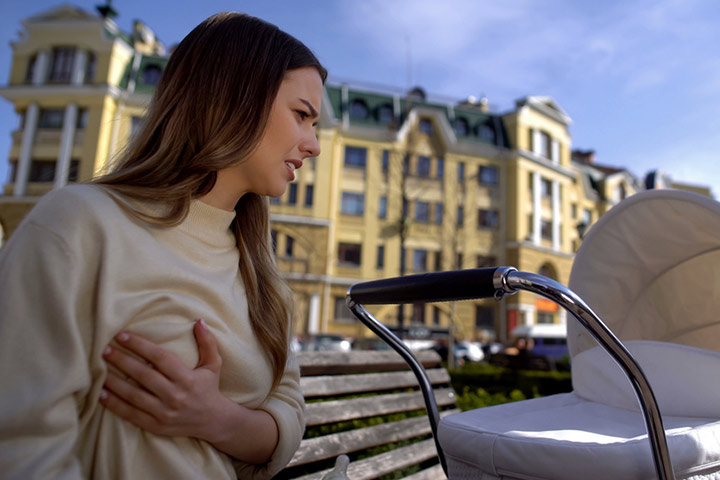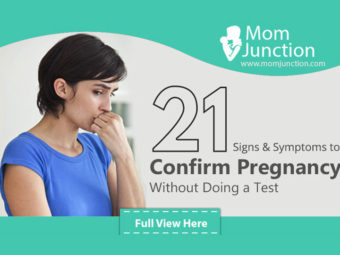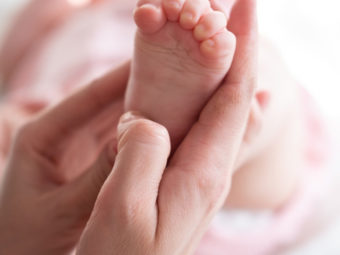
Image: Shutterstock
It’s no news that breastfeeding has several benefits. It’s nature’s perfect baby food and provides the ideal nutrition for infants. It contains the perfect mix of proteins, vitamins, fats, and minerals that a newborn needs for growth and development. It helps babies build strong immune systems and naturally soothes them.
Breastfeeding is an intimate process that builds a strong bond between the mother and baby. The benefits of breastfeeding are not only limited to the baby but help mothers too. It produces oxytocin and prolactin, which helps reduce stress and evoke positive feelings in the mother (1). With so many benefits, it is without question that breastfeeding is the best way to nurture babies. But what do you do when you’re sick?
What happens when you fall sick while breastfeeding your baby? Is it still safe to breastfeed, or will your baby be put at risk? Many new mothers have these questions, and today, we are here to answer a few of the most common questions about breastfeeding while being sick.
Image: Shutterstock
Is It Safe To Breastfeed When I’m Sick?
In short, the answer is yes. Breastfeeding has several benefits, and when you’re sick, those benefits remain. Transmission of infection through breast milk is very low. However, in cases of HIV positive mothers, she would need counseling to determine the different feeding choices available to her (2).
Image: Shutterstock
Will My Baby Fall Sick With My Infection?
Breastfeeding helps babies build strong immune systems. It provides the necessary nutrients for the baby and is packed with antioxidants, antibodies, and enzymes. When a mother is sick, her body produces antibodies to fight against the illness. These antibodies are present in the mother’s mature immune system, exposed to the baby. They enter the milk and transmit it to the baby through breastfeeding to protect the infant from falling sick. The lining of the baby’s intestines is coated by Immunoglobulin A, which prevents germs and allergens from leaking into the system. Therefore, your baby will be protected from the infection (3).
Image: Shutterstock
我该怎么办如果我有乳腺炎呢?
Mastitis mostly occurs when milk is trapped in the breast. It can also occur due to clogged milk ducts or when the milk is not emptied from the breast during feedings. Mastitis causes inflammation, which may lead to infections. It can be quite painful. The inflammation causes redness, swelling, breast pain, and tenderness. You may also have chills and a temperature.
It might be challenging to care for your baby when you have lactation mastitis. Some women may be forced to wean their baby before they intend to because of this. But it is recommended that you continue to feed your baby while treating mastitis with antibiotics. It is better for you and your baby (4).
Image: Shutterstock
What Can I Do To Maintain Good Breast Health?
New moms may get nervous and anxious about breastfeeding. But with the right breast care, you will produce healthy and nutritious milk for your little one. Therefore, establish a routine where you check your breasts and nipples regularly to prevent complications. Here are a few tips for maintaining good breast health (5):
- Wear a comfortable and supportive bra. Nursing bras are the most convenient ones that are suitable for breastfeeding mothers. Avoid wearing bras that are too tight.
- Avoid wearing tops and bras that are restrictive and have underwires that may cause blocked milk ducts and lead to infections.
- Don’t miss taking your daily shower and use only clean water to cleanse your nipples. Avoid using soap or other chemicals on your nipples because it washes off the natural lubricant, which may lead to dryness and cracks.
As a breastfeeding mother, the last thing you want is to cause any harm to your baby. Therefore, it’s natural to worry if you’re doing the right thing for your baby. If you have any doubts or questions, always consult a medical professional or a lactation expert for proper breastfeeding guidance.
Share this article with fellow mothers to help them like it helped you!
















